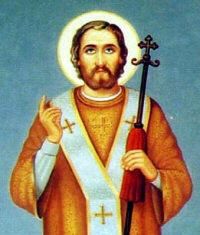
Bishop of Constantinople, Doctor of the Church
Patron of Preachers
347-407


Called “golden-mouthed” for his great eloquence
__________________________________________________________
From his homilies:
The power of Christ’s blood
For love of Christ, Paul bore every burden
Five paths to repentance
Commentararies
On the Gospel according to St. Matthew
On the Gospel of St. John
On First Letter to the Corinthians
On the Second Letter to the Corinthians
Life to me means Christ, and death is gain - Homily before departing for exile
__________________________________________________________
He was born in Antioch to Christian parents around the year 349. His mother was a model of virtue. He studied rhetoric under Libanius, the most famous orator of his time and, in 374, began to live the life of an anchorite in the mountains. In 386, his poor health forced him to return to Antioch. He exercised, with great success, the ministry of preaching.
In 397 he was elected Bishop of Constantinople, a charge which he carried out as an exemplary pastor, which gave him the strength to accomplish a strict reform of the customs of the clergy and the faithful.
His rectitude in proclaiming and defending the truth earned him many enemies. The opposition of the imperial court and of those who were envious of him invented accusations against him and led him to be exiled twice, and eventually to Pityus (modern day Georgia), at the very edge of the empire. One of his enemies, Theophilus, the Patriarch of Alexandria, repented before his death. Another enemy was the empress Aulia Eudoxia.
He had the consolation of being always able to count on the support of the Pope and he endured all his tribulations with great valor and faith.
Finished by so many miseries, he died in Comana, in Pontica, on September 14, 407. He contributed in a great manner, by his words and writings, to the enrichment of Christian doctrine, earning him the name of Chrysostom, that is, “Golden-mouthed”.

